By Hayagriva Dasa
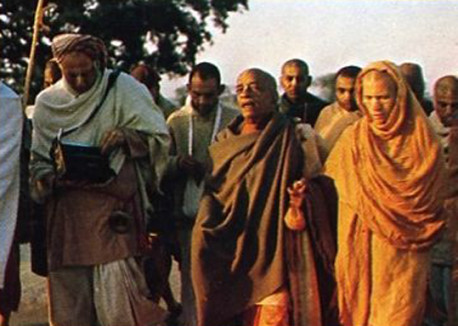
Vrndavana, India, the land of Krsna five thousand years after the disappearance of the Supreme Person, is invaded by eighty American and European disciples of Srila Prabhupada. The white and saffron robed pilgrims arrive in Vrndavana for Karttika, a celebration of Krsna’s rasa dance with the cowherd girls (gopis) of Vrndavana. Yearly, Vrndavana is crowded with Karttika pilgrims from October 15th to November 15th, the best time of year for Vrndavana, a month of clear, pleasant days and cool nights.
Vrndavana is approached by train from Delhi to Mathura, about ninety miles to the Southeast of Delhi. From Mathura, one takes a bus some eight miles to the village of Vrndavana bordered on three sides by the holy River Yamuna. As a cowherd boy, Krsna sported in the Yamuna, and Vaisnavas consider its waters more purifying than the Ganges itself. In Krsna’s time, Vrndavana was a forest, as its name indicates. Today it is a congested holy-town forgotten by the tourist maps, a town of crumbling temples, memories, chanting devotees, filth and poverty-stricken masses. Tourists whiz by it on the Delhi-Agra Express, unaware of passing Krsna’s old abode. Vrndavana was rediscovered by Lord Caitanya Mahaprabhu and His disciples Rupa and Sanatana Gosvami in the early 16th Century. Many magnificent temples were built in honor of Lord Krsna, but despite the sanctity of the place, it has not been kept up.
Yet no one can deny the spirituality surcharging the atmosphere above the mud, above the forgetfulness.
The stars of Orion ascending … mrdangas, horns and bells wafted by the wind … the dogs quiet after a symphony of agonizing howls … the night before full moon rasa dance night … the samadhi (tomb) of Rupa Gosvami silent with the peace of four centuries … long branches of the eucalyptus swaying, rustling gently … a monkey scurrying across the roof of Radha-Damodara temple … forms iridescent, self-luminous it seems in the moonlight …
At six a.m. Srila Prabhupada leaves Radha-Damodara followed by a half dozen disciples, steps lightly over refuse and walks quickly to Parikrama Path, a dirt road along the Yamuna which circles Vrndavana. The Yamuna meanders, leaving many ghatas beside the parikrama high and dry. Srila Prabhupada strolls with his head high in the morning air. “The Yamuna was broken many places by Balarama’s plow,” he says. Mantras from Rangaji Temple flow through the air. “You can learn such mantras,” he says. Peacocks scurry along, unreal blueballs swaying on their heads. Srila Prabhupada turns to me. “So how do You find Vrndavana?” he asks. “Beyond words,” I answer. Srila Prabhupada has his secretary gather a handful of water from the Yamuna and sprinkle it over his head. “This is as good as bathing in it,” he says and walks on. We pass Imlitala Temple and the ancient tamarind tree in its Courtyard. It is said that Caitanya Mahaprabhu meditated eight days on the pastimes of Krsna beneath that very tamarind. A little further we come to the tall red-brick spires of Madana-mohana, Vrndavana’s oldest temple, established by Sanatana Gosvami. Srila Prabhupada asks the time, then turns back, taking care not to be late for the lecture at seven.
“From ’56 to ’65 I was in Vrndavana,” he says. “I would sit at Radha-Damodara and chant Hare Krsna and see the samadhi of Rupa Gosvami. And I would type and cook a little. These samadhis are the best in Gaudiya Vaisnavism. They gave me inspiration to go to the West. I have a hundred places to go now, but I still like it here.” He turns to me. “What do you think, Hayagriva?”
“I’m glad you asked me here, Srila Prabhupada.”
“I think the sanitation facilities are not up to your country’s,” he laughs. Then seriously: “Since I lived here the city has deteriorated. The sewage has spoiled it all. Instead of Vrndavana it is becoming a dungeon. Now there is no place to go in the Yamuna. Gradually they will pollute the whole city.” As he speaks, love and regret for Vrndavana are in his voice. I recall his dream to renovate the town, rediscover it just as the Gosvamis did. “The ugliness that you see here is yogamaya,” he says. “It is Krsna’s covering. Vrndavana appears this way to drive away the atheists and impersonalists. For a devotee it is as good as Goloka Vrndavana [Krsna’s transcendental abode], but one must have the eyes to see.”
Returning to Radha-Damodara we pass many white Brahman cows, which resemble the cows in the popular prints of Krsna, lotus-eyed cows with long ears, dewlaps and humps. Despite a diet of paper, banana peels and other refuse, they seem surprisingly fat. Their eyes remind me of the jerseys in New Vrndavana, and I wonder how they would appreciate a diet of hay and grain. Vrndavana has a remarkably large population of cows, dogs, hogs and monkeys. The dogs snarl, howl, cower and starve. They are all small with pointed faces, and few wag their tails. The monkeys are large and aggressive, and they fare quite Well. They are good thieves, not only of food but of cassette recorders and cameras, which, it is said, they trade in the marketplace for bananas. The hogs constitute the sanitation department of Vrndavana; their snouts plow right down the open sewers devouring stool and indescribable filth.
“It may not be very palatable to hear,” Srila Prabhupada says, “but there is a reason for so many dogs, hogs and monkeys in Vrndavana. The gosvamis who live in Vrndavana and outwardly observe the religious forms but secretly commit all kinds of sinful activities take birth as dogs and hogs in Vrndavana. In this way, by touching the dust of Vrndavana, they become purified. Then after a life as a hog, they are liberated.”
I watch a hog nose through an exceptionally fresh heap of stool. “There I go,” I think to myself and promise to be more careful.
Srila Prabhupada walks into the Radha-Damodara courtyard, offers obeisances before the Radha-Krsna Deities of Jiva Gosvami, then passes through an archway to Rupa Gosvami’s samadhi and a smaller courtyard where his disciples are assembled chanting Hare Krsna. Vrndavaners circumambulate the Govardhana stone situated in the temple. Most stop to offer obeisances to Prabhupada. The chanting stops when he enters, the disciples bow to the ground, Srila Prabhupada sits on the vyasasana, looks at his audience with radiant smiling eyes, picks up cymbals and leads the chanting:
jaya radha-madhava kunja-vihari
gopi-jana-vallabha giri-vara-dhari
yasoda-nandana braja-jana-ranjana
yamuna-tira-vana-cari
“Glory to Radha-Madhava, enjoying in the bushes of Vrndavana. O protector of the gopis, You are the lifter of Govardhana Hill. O son of Mother Yasoda, You wander through the forests on the bank of the Yamuna just to please the inhabitants of Vraja.”
The devotees sit before him, rapt … Vrndavaners continue to circumambulate the Govardhana stone … a devotee fans Prabhupada with a silver handled yak tail, another with a peacock fan … the chanting reaches its climax … obeisances … Pradyumna begins reading from Srimad-Bhagavatam … Om namo bhagavate vasudevaya: “I offer my obeisances to the Supreme Personality of Godhead, Vasudeva,” Pradyumna reads, and the disciples repeat in unison. “Sri Krsna, the Personality of Godhead, who is the Paramatma (Supersoul) in everyone’s heart and the benefactor of the pure devotee, cleanses desire for material enjoyment from the heart of the devotee who relishes His messages, which are in themselves virtuous when properly heard and chanted.”
![In the streets of Vrndavana: "There is a speck covering your eye, and when it is removed you will see all this as Vaikuntha [the spiritual sky]"](http://back2godhead.com/wp-content/uploads/2013/12/1973-01-53-10-458x320.jpg)
Srila Prabhupada repeats the Sanskrit and begins his lecture. “To become Krsna conscious is not a very difficult thing,” he says, “but people have no taste. They do not understand the importance of this Krsna consciousness movement, yet this is the only way they can become peaceful and happy. This Srimad-Bhagavatam is like a sword in the hand. With it, intelligent men cut through the labyrinthine knot of karma. If you hear about Krsna, think about Him, meditate on Him and worship Him, you become perfect. It is very simple. Here is God; we give His name, address, phone number, everything. Simply qualify yourself to go there by thinking of Him. By thinking of Him you will become the greatest yogi, for Krsna is the goal of all mystic yoga—Yogesvara. You cannot serve Krsna with these blunt material senses. Krsna cannot be served with matter—only with spirit. There are so many impediments to worshiping the demigods, but there is no impediment to worshiping Krsna. You simply have to offer Him love. In the material world people are always speaking about love, but there is no love in the material world. People are simply under the control of lust and are trying to satisfy their senses. But love is different. Love is the satisfaction of Krsna’s senses.”
Prabhupada lectures about forty-five minutes, and after the lecture the devotees chant Hare Krsna, and Prabhupada returns to his room beside the main courtyard. He receives visitors in his room for thirty minutes or an hour after the lecture, then he goes upstairs to his quarters on the roof. The devotees return through the busy morning streets of Vrndavana to Rani Laksmi Kunja, a beautiful 200-year-old palace near Kesi Ghata. The palace, belonging to the King of Bharatpur, is loaned to the devotees during their stay. A pujari maintains and serves Radha-Krsna Deities in the main courtyard. The walls of the palace are about three feet thick, and many of the rooms are inhabited by bats and lizards. Elaborate carvings adorn the walls surrounding the main courtyard. The River Yamuna flows outside, and many Vrndavaners wash their clothes beside the monstrous turtles that bob up and down in the holy waters. Sometimes the turtles steal the clothes.
Between Kesi Ghata and Radha-Damodara is the field of the rasa dance, surrounded by a wall ten feet high and guarded by packs of monkeys. Walking down the streets, one feels the fear of sinking in the ocean of Vrndavana … ragged urchins in the street … dark skin, shining black hair, radiant eyes, smiling. They stop to look at the foreigners and jabber in Hindi. Wizened old ladies bow … Jaya Radhe … haribala … Hare Krsna. Everyone wears tilaka, and tilaka, beads and beadbags are sold in the market. On the ghatas, ganja smokers smear their bodies with ashes. After walking down the streets, a Westerner instinctively seeks an escape from the filth and squalor. There are no accommodations for Westerners. Only a devotee would remain in Vrndavana for more than a day. On the main street there are a couple of restaurants where a rupee (10 cents) can buy a generous serving of rice, dahl, vegetables and capatis. Fruit stands on the streets are cove red with flies. Transportation is primarily by bicycle and cycle rikshas. Old women are predominant, and everywhere are the shouts of children. Most people are gentle and friendly, but some are a little suspicious.
From Rani Laksmi Kunja one can see the depleted state of the land. The wonder is that it feeds the people at all. Even the vegetables it yields cannot give sufficient nutrition. Despite these material conditions, there is an unseen and vibrant spirit that moves the people. I sense strongly that there is more to Vrndavana than meets the occidental eye.
In the evening from five to six Srila Prabhupada lectures on Rupa Gosvami’s Bhakti-rasamrta-sindhu (Nectar of Devotion) in the courtyard. Sometimes it is hard to hear him above the chatter of the birds, and sometimes a monkey fight temporarily interrupts the lecture.
“When Krsna comes,” Srila Prabhupada says, “He appears here in Vrndavana. Therefore this Vrndavana dhama is so important to the devotees.” I look about and consider the veil of maya over my eyes. I recall years previous amidst the soot and traffic roar of New York’s Lower East Side that Srila Prabhupada said, “There is a speck covering your eye, and when it is removed you will see all this as Vaikuntha [the spiritual sky].” Now he delivers the same message. “Everyone can see God,” he says. “It is not very difficult. God is everywhere. In Bhagavad-gita He describes Himself. Everyone drinks water, and Krsna says, ‘I am the taste of water.’ Atheists are always saying, ‘Show me God,’ but if you have the eyes to see God, you can see Him everywhere. If you become saintly by austerities, you can see God everywhere. If you are a materialist, you can also see God in the sun and moon. Those who are impersonalists can see God in that way. Hiranyakasipu challenged God, so God came before him as death. God is willing to reveal Himself according to our expectations. All rasas [relationships] are there in Krsna. We can enjoy loving pleasure with Krsna in any rasa, and Krsna is ready to respond in any rasa. The gopis came to Krsna out of lust, but their lust became purified. Try to approach Krsna in some way or another. Kamsa was also Krsna conscious, but he thought of Krsna as an enemy. Nonetheless he was liberated. So what to speak of those who are in love with Krsna? Krsna is like the sun; He purifies everything. Whatever way you approach Krsna, you will become purified. Divert your attention to Krsna, and that is love. You have a particular relationship with Krsna which will gradually be revealed as you follow the rules of the acaryas. Just as the desire for sex is in all entities and becomes manifest at the right age, so svarupa-siddhi [our constitutional position] becomes manifest at the right time. The sun becomes visible when it rises. You cannot force the sun to rise at midnight. Be patient, render devotional service and wait. Guru Maharaja said, ‘Don’t try to see Krsna. Just get Krsna to see you.’ Try to get His attention by serving Him under the orders of the spiritual master.”
At the conclusion of the lecture, Acyutananda Svami says, “The people here in India are always accusing us of taking to Krsna consciousness because we are American and have had sufficient sense gratification and material development. They say, ‘First we will develop materially and then take to Krsna consciousness.'”
“Then the hogs are best qualified to be devotees,” Srila Prabhupada quips. “The hogs have license for all kinds of sense gratification, and they do whatever they want. They have unrestricted sex life with their mothers and sisters. They are the most highly sense gratified animal in existence. And by this logic they will be the best devotees. The position that we first have to complete our materialistic sense gratification is rascaldom. It is like trying to extinguish a fire by pouring ghee on it.”
When someone mentions Hinduism, Srila Prabhupada says: “We are not preaching Hinduism. We are attempting to create a society of devotees all over the world, regardless of creed or color. One jnani came to me yesterday and said, ‘The Moslems used to convert the Hindus, and now the Hindus are converting the Christians. So what is the difference?’ But we are not making Hindus. My Guru Maharaja never said that Hinduism is better than Christianity. We are simply trying to convince people that their original position is with Krsna. The word ‘Hindu’ is given by the Moslems. It is not found anywhere in the Vedas. Actually our system is that of varnasrama-dharma, and it is applicable anywhere. The sun is the creation of God, and it is visible everywhere. Similarly, Krsna is not the monopoly of India. Our system is not to change Christians into Hindus, but to revitalize our lost constitutional position as servants of Krsna. These boys and girls are not working for any nation. They are working for Krsna. They have understood that Krsna is the Supreme Personality of Godhead. They are not working for some Hindu god; they are working for the Supreme Lord Himself.”
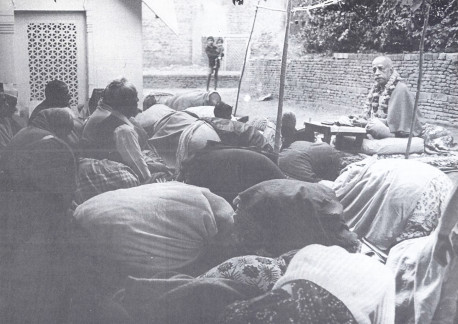
After the evening lecture, Srila Prabhupada receives guests in his room. Most of these visitors are Indian, and they offer obeisances to Srila Prabhupada, touching his feet. Sitting on a dais in the center of the room, he receives respect even by his silence. From time to time people ask questions. Prabhupada surveys his audience and waits. At length a new American devotee asks, “What is the relationship between the disciple and the spiritual master?” The silence resumes. It is not a question to ask Srila Prabhupada personally, for the answer is found in every one of his books. Srila Prabhupada turns to me. “How do you answer him, Hayagriva?”
“The disciple does whatever the spiritual master asks. His relationship is that of the servant to the master.”
“That of a menial servant,” Srila Prabhupada corrects. “Even if the spiritual master asks him to clean the stoolhouse, he will do so.”
“It is said that the spiritual master is the well-wisher. What does this mean?”
“Krsna is the friend of everyone,” Srila Prabhupada says. “If I deliver the message to you that Krsna is your friend, I also become your friend. This is friendship—preaching Krsna consciousness. When you are in danger, no one can give you protection but Krsna. Therefore He is your only friend. Our business is only to deliver the message of Krsna and point out that Krsna is your friend. He is also the proprietor. Whatever you claim as your property will be taken by Krsna when you die. To educate people that Krsna is the proprietor is real friendship. Just spread this message of Krsna and you become the friend and well-wisher of all people. To become a spiritual master is not very difficult; we simply have to carry the message of Krsna with no adulteration. I am simply a peon delivering the message of Krsna to you. Although I personally may be the greatest fool, since the message I am delivering is from your dearmost friend, I also become your dearmost friend.”
Guru dasa, just arriving from Delhi, comes in and offers obeisances to Srila Prabhupada. “I just want to sit at your feet, Prabhupada,” he says.
Srila Prabhupada laughs like a naughty boy. “But my feet are always moving,” he says.
That night I sleep on the roof of Radha-Damodara … throughout the night I periodically awake. The white-domed samadhi of Rupa Gosvami glistens in the moonlight. A near full moon sets behind the eucalyptus tree … all night kirtana … cymbals, mrdangas, voices in the temple courtyard … all night I watch the moon sink from the zenith. There is enough moonlight to write by. Dogs howling eerily like a human chorus, wailing a canine catharsis. A small 1940 style U.S. streetlight is dwarfed by the moon. The samadhi of Rupa Gosvami! The lilt of kirtana grows louder, the sway of voices together rowing … the good ship harer nama … howls of dogs joining the kirtana … the approach of dawn and robed figures gliding quietly to the courtyard … the presence of Krsna slowly but unmistakenly making itself felt … the drapes of the Radha-Krsna Deities open, voices grow louder … cacophony of bells … Vrndavaners standing in the courtyard before Their Lordships … the smoke of burning cow dung and incense wafts across the roof … people awake … lanterns … the clank of buckets … voices … figures bowing in the pale light and shadows … bells continuing, shouts … the moon, yellow, heavy, pregnant, descending. A voice sings bhajana over a loudspeaker … the dogs starting up again … the long, long howls … a woman’s voice sings govinda jaya jaya/ gopala jaya jaya/ radharamanahari govinda jaya jaya. All glories to Govinda, to Him who gives pleasure to the cows and the senses. All glories to Gopala, the cowherd boy. Glories to Sri Hari, the enjoyer of Radharani. I see the fading Pleiades between Orion and the moon. The frightening vastness of space … the repose, the presence of Rupa Gosvami. The voice of Srila Prabhupada: “This maha-mantra is coming from Goloka Vrndavana. Just as you receive radio messages from distant places, you can also receive messages from Goloka Vrndavana by the radio of Guru Parampara. You can receive messages from Krsna by way of Brahma, Narada, Vyasadeva, Lord Caitanya and the Gosvamis. And now this message is being broadcast by this Krsna consciousness movement. The message is the same: give up everything and surrender unto Krsna.” Messages from Goloka Vrndavana! Messages from outer space!
Bells, mrdangas, moon behind the eucalyptus, Orion at the zenith … a woo woo woo Comanche yell in the courtyard … Deities undraped … old ladies, the same in all religions, widows … old men standing before the Deities, now suddenly joined by young Americans … ding ding dong dong ke-lash ke-lash … old ladies scurrying with lanterns not to be late … Radhe-Govinda chanted … early mangalarati … dozens circumambulating … Jiva Gosvami’s black Krsna Deity … ghee lamp circulated … water … Radha-Damodara ki jaya! … people dance in a small circle to the right of the Deities … kirtana … the infirm bowing, touching the dust to their heads, rolling in the dust, eating the dust … indescribable … kirtana groups dance in circles before the Deities … Nitai-Gaura haribala!
Just before sunrise we follow Srila Prabhupada to the parikrama.
“If we present things as they are,” he says, “they will be accepted. People are saying that Prabhupada is performing miracles, but he says that the miracle is in presenting things as they are. “
We pass by a group of women in an open temple chanting to Radharani. On the side of the street lay little huddled forms covered by burlap bags and saffron cloth. They fear no burglars.
“In the U.S. they are saying that God is dead,” Srila Prabhupada says. “They are saying this even in the churches. And in India they are saying there is no need to serve God—just serve the poor man loitering in the street. So you can see that there is a great necessity for Krsna consciousness in the world. Bhaktisiddhanta Sarasvati said, ‘I don’t find any scarcity in this world except the scarcity of Krsna consciousness.'”
Back in his room Srila Prabhupada receives letters on the progress of the movement from all over the world. He reads them, makes comments and gives instructions on management. He stresses the importance of mutual respect amongst the devotees.
“In the lower stages one simply sees Krsna in the Deity and does not care for the devotees,” he points out. “But the fact is that the devotees are always in the service of Krsna, and they should be taken care of. The person who worships the devotees is more important than the person who worships Krsna. An advanced devotee always gives respect to another devotee. Therefore we address one another as prabhu [master]. This should be realized, not just spoken. We should always be ready to offer respects to everyone because everyone is originally a devotee of Krsna.”
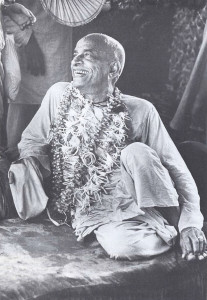
Prabhupada then outlines a program for Bombay, Delhi and Calcutta. He draws the rough sketch, and the devotees fill in the details. “If a temple is occupied,” he says, “it must be kept up. Otherwise there is no need to occupy it just to hold property. Krsna had no interest in worldly acts, but because the world belongs to Him, He wanted to establish good government.” Prabhupada surveys his leaders and continues. “He wanted Maharaja Yudhisthira to take charge, and later Pariksit Maharaja. When such kings took charge, there was no scorching heat or freezing cold. Like such devotee kings, we should make people Krsna conscious; then from all points of view the people will be benefited. Krsna conscious people are not sentimentalists. They want to reform the world. Krsna consciousness is not just sitting and chanting for cheap adoration. Inactivity and silence are not perfection. Activity is perfection. Arjuna was not silent or inactive. He thought, ‘If I fight, my Lord will be pleased. I have to do this.’ His activity was spontaneous activity. When one knows the Lord and what He wants, there will be activity. Up to seventy years of age I was doing nothing, but by the grace of God I went to the United States to begin this movement. Now that we are becoming successful we can expect to meet with so much resistance. Although Gandhi used to use Bhagavad-gita, now Gita is not allowed in the schools in India. But now in the Western countries our Bhagavad-gita As It Is is selling more copies than any other edition. I have great hope for the Western countries, for they are taking up this movement seriously. Here we are seeing many temples, and we are also seeing the pujaris smoking. How can a person chant with one hand and smoke with another? It is ludicrous. Such a person cannot be a devotee. Unless we are free from sinful activities, we cannot actually engage in devotional service. Now everyone is claiming, ‘This is my country. This is my land.’ But the world belongs to Krsna, so how can anyone claim it? We are simply guests here for a few years. The land was here before our birth, and after our death it will still be here. How is it ours? How can a mere visitor claim proprietorship? In this way we have to educate the people.”
There is a silence as everyone realizes that any comment would appear foolish. Prabhupada looks at the young faces about him and sees agreement and anticipation.
“We must become one in Krsna’s service. Oneness means individual opinions coincided in the service of Krsna. Just as in a family all the individuals work for the family—that is oneness. It is a little something like national consciousness. In Krsna consciousness all individuals agree to work for the satisfaction of Krsna. That is oneness. We are preaching love of God, but most people do not know how to love God. They do not know because they are ignorant of God’s form. The fact is that most people do not want to proceed past impersonal Brahman realization. You have to go beyond that to realize God, for you cannot love mere air and sky. There must be a form to love. Isvarah paramah krsnah sac-cid-ananda-vigrahah. Vigraha means form, and it is that form that invokes Our love.”
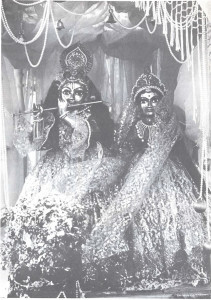
It is time to go to the courtyard. All problems cleared, the devotees offer obeisances to the Master.
“The path of Krsna Consciousness is just like a sharpened razor,” Prabhupada warns. “if you are expert, you get a clean shave. But if you slip, you get cut.”
We follow him into the Courtyard where kirtana is going on. Kirtana stops, obeisances are offered, Srila Prabhupada chants and then begins to talk of tile expansions of Krsna. At length the subject turns to Vrndavana.
“We should try to make Krsna happy like the gopis of Vrndavana. In Vrndavana everyone is trying to please Krsna—the birds, trees, cows, the river and all His associates. It is not that Vrndavana is only here. We can have Vrndavana everywhere. Krsna is not limited. We should not think that Krsna is far away in Goloka Vrndavana and cannot accept food from us. If you offer food with love, Krsna eats. Krsna does not leave Goloka Vrndavana, but His expansion goes and accepts food. This Vrndavana, which so happens to appear in India, is as worshipable as Krsna. As Krsna is worshipable, His dhama [residence] is also worshipable. So we cannot offend His dhama. If we live in Vrndavana, we are living with Krsna, for Vrndavana is nondifferent from Krsna. There is no difference between the original Vrndavana and this Vrndavana. Vrndavana is so powerful.”
I stifle sudden outrage. My comprehension is staggered as I consider that in Krsna’s abode there is no distress, no death. There everything is full of knowledge, bliss and eternality. Who could walk through the squalor and suffering of Vrndavana and claim it to be nondifferent from Krsna and His abode? My American sense of propriety and logic demands an explanation. I hold my tongue throughout Prabhupada’s lecture and afterwards hurry to his reception room to question him before the crowd presses in. He sits regally on his dais, and I feel myself shrink a little and my outrage drop.
“Prabhupada,” I venture timidly.
“Yes?” He looks straight at me.
“I’m a little confused by what you said in your lecture. You said that this Vrndavana is nondifferent from Goloka Vrndavana, and I’m a little confused by that because—”
“You must be confused,” he says, looking down at me. “You are not perfect.” Silence. My heart stops. “Are you perfect?”
“No,” I answer, feeling about two inches high.
“Then You must be confused.”
“I’m not the only one who’s confused,” I say stupidly.
“If you’re not perfect, you must be confused. That is the only answer.”
“There is no other answer?” I ask, crestfallen.
“If you are not perfect, how can you get the right conclusion?”
“Most things I call understand, at least intellectually, but—”
“That means you are not completely perfect. As far as you are perfect, you understand. Because our senses are imperfect, we understand in an imperfect way. This means that we must understand from the authorities. Caitanya Mahaprabhu says that Vrndavana is as worshipable as Lord Krsna.”
“I can understand that,” I say, “but there’s birth, old age, disease and death here … all the material miseries.”
“This is not Goloka Vrndavana. This Vrndavana is a replica, but the laws of this material world are working here. We are worshiping Deities in the temple, and everyone is seeing that they are made of stone and wood, but still the Deities are not different from Krsna. They are Krsna. We are not worshiping wood and stone, but to the naked eye they appear so. When Caitanya Mahaprabhu went to Puri and saw Jagannatha, He immediately fell down and said, ‘Here is Krsna.’ It is a question of vision.”
“The other thing I understood maybe incorrectly was that when Krsna departed from this earth, He took His paraphernalia and His dhama with Him to the spiritual sky.”
“You can use what is called a circuit house as all example here. A governor may come and go from a circuit house and take his paraphernalia with him. He may come and go with his things, but his house is still there. Whenever Krsna comes to this planet, He comes to this place. So this Vrndavana is as good as Goloka Vrndavana.”
“But He won’t come here again in this age?”
“No, not in Kali-yuga. But when He comes, this is the place.”
“But it wasn’t like this when He was here.”
“That may be. But that doesn’t mean the place is less important. It is our offense that we are keeping the place not so nice. And we have to suffer for it. Those who are responsible for keeping up this place are neglecting their duty, and they have to suffer. They have to take another life as dogs and hogs here. The hogs, dogs and monkeys here are not ordinary. They are devotees who have committed offenses, so their offenses are being compensated by accepting another life in Vrndavana. In this way they will be purified and liberated. Although they may be hogs, they are not losers. So Vrndavana is even more important because even the hogs and dogs here are going to be liberated. Life here is not Polluted because even the most Polluted are being purified.”
The Vrndavana system, which had been veiled to me, begins to clarify. Still I think of the clean, well manicured lawns of bourgeois America.
“Is there any particular reason Krsna allows His own home to deteriorate?” I persist.
“It is not deteriorated. If even the dogs are going to be liberated, how is it deteriorated?”
“But it is not nicely kept up.”
“Not nicely kept up in your eyes. But if it were not nicely kept up, how could the dogs and hogs be liberated?”
I consider this point, and the fog begins to roll away.
“Just like some people try to find fault in Krsna,”Prabhupada continues, “but a devotee sees that despite all these things, Krsna is Krsna. Even if the people here do not appear Krsna conscious, they are most fortunate because they are on the land of Krsna.
Jaya jaya vrndavana-vasi yata jana. All glories to all the inhabitants of Vrndavana! There is no discrimination that just the devotees here are glorified. Everyone. Even the hogs. It is more fortunate to be born in Vrndavana than in a rich or aristocratic family, for in the next life one will return back to Godhead. Even the hogs are devotees and are liberated. Unless one is a devotee, he cannot take birth here. They may take a hog’s or dog’s body for a few years, but that is not an impediment. They are simply getting rid of their sinful activities.”
“Isn’t there another way to do it?”
“Why do you want another way? What other way do you suggest? Suppose one is not born as a dog or hog’? Does that mean he is very elevated? In a hog body at least you don’t have a chance to commit more sins. Because you’re an animal, you don’t have to be bound up again by another karma. Animals have no karma. They are finishing their karma, not making new karma.“
“The hogs seem happier than the people,” I admit.
“Yes. They only have one life to suffer. A hog only eats stool, but a man eats everything. He becomes more implicated.”
“Even though the people here don’t have a bona fide spiritual master, can they still be liberated?” someone asks.
“Yes. They are liberated without a spiritual master because Vrndavana is directly under the supervision of Krsna. Krsna is their spiritual master.”
It is a lot clearer now, Srila Prabhupada,” I say. “Thank you very much.”
I offer obeisances and leave. As I walk out into the street, a new and sanctified Vrndavana lies before me.
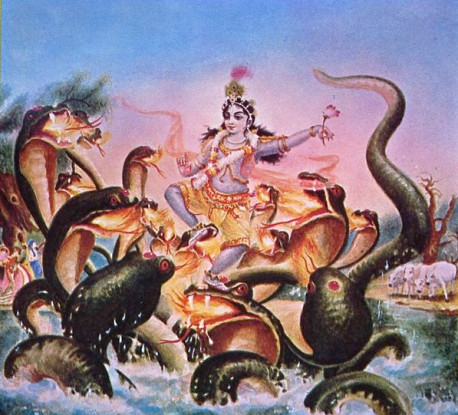
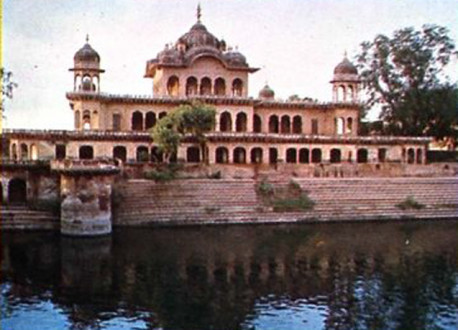
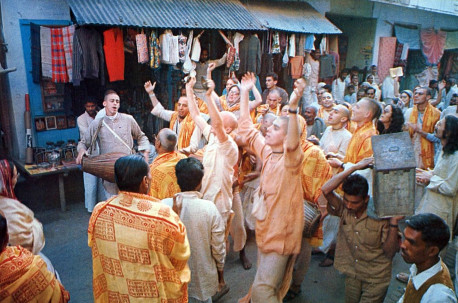

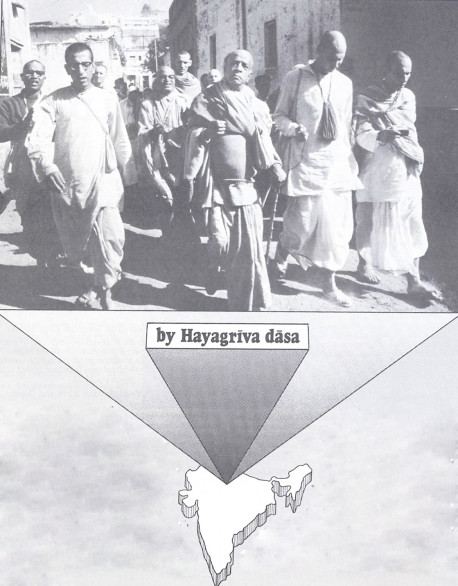
Leave a Reply